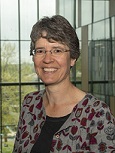Contributors > Key-note speakersThere will be two key-note speakers:
Lucy Vickers is professor of Law at Oxford Brookes University. Her main research area is the protection of human rights within the workplace and aspects of equality law. She has written extensively on issues relating to religious discrimination and age discrimination at work. She is the author of Freedom Of Speech and Employment (2002, OUP), and Religious Freedom, Religious Discrimination and the Workplace (2nd ed. 2016, Hart Publishing), and a report for the European Commission on Religion and Belief Discrimination in Employment – The EU Law (2007). Recent publications include: "Employment rights of teachers in faith schools: maximising the religious rights of schools and staff" (2024) 15 (10) Religions 1277; "Religious Discrimination, headscarves and the CJEU: Exclusive neutrality or exclusionary practice?" (2024) 10 (2) International Labor Rights Case Law 228; and "Achbita and Bougnaoui: One Step Forward and Two Steps Back for Religious Diversity in the Workplace" (2017) 8(3) European Labour Law Journal 232. She is co-author of a report for the UK Equality and Human Rights Commission: Review of equality and human rights law relating to religion or belief’ Research Report 97, EHRC, London, 2015. She is the UK expert on non-discrimination for the European Equality Law Network. Her presentation will be about
Religion and Belief Equality under Directive 2000/78: Challenges for EU Integration This paper will consider the development of the law on religion and belief discrimination in the EU since the introduction of the Employment Equality Directive 2000/78 (the Equality Directive) in 2000. The case law has focused on the treatment of religious dress codes under the Equality Directive, and the scope of the exception available for religious ethos employers to impose religious requirements on their staff. Both sets of cases create challenges for the CJEU in balancing concerns for equality with a concern for business autonomy and for religious freedom.
* * *
Jeffrey Haynes is emeritus professor of politics at London Metropolitan University, UK. He is the author or editor of more than 60 books, including: Christian Nationalism and Democracy in Ghana, Routledge, 2025; The Routledge Handbook of Politics and Religion in Contemporary USA, Routledge, 2025; The Routledge Handbook of Religion and Politics (3rd ed.), Abingdon & New York: Routledge, 2023; Revolution and Democracy in Ghana: The Politics of Jerry John Rawlings, Abingdon & New York: Routledge Contemporary African Politics Series, 2023; The Routledge Handbook of Religion, Politics and Ideology (ed.), Abingdon and New York: Routledge, 2022; Handbook on Religion and International Relations (ed.), Cheltenham UK and Northampton, MA, USA: Edward Elgar Publishing, 2021; and, Trump and the Politics of Neo-Nationalism. The Christian Right and Secular Nationalism in America, Abingdon and New York: Routledge, 2021.
Jeffrey Haynes is co-editor-in-chief of Democratization, editor for religion, Heliyon, and editor of the Routledge book series, 'Religion and Politics'.
His presentation will be about
Christian nationalism and liberal democracy: Europe and the USA in comparative focus The lecture examines the comparative impact of Christian nationalism on liberal democracy in Europe and the USA. Christian nationalism, a political ideology and cultural framework, advocates the fusion of a particular form of Christianity in a country’s civic life and political institutions and for a privileged place for Christianity in the public realm. Christian nationalism may be a danger to liberal democracy because, when it becomes entrenched in national politics, democratic quality may be undermined, including in relation to human rights and inter-racial and ethnic relations. Christian nationalists prioritise power and control over others and support politicians who promise to protect or restore the hegemony of Christianity. For Christian nationalists, upholding what they regard as ‘Christian values’ may be more important than consistently observing democratic norms. The aim of the lecture is to assess the comparative influence of Christian nationalism in both Europe and the USA, in relation to liberal democracy. |

 Lucy Vickers
Lucy Vickers Jeffrey Haynes
Jeffrey Haynes
